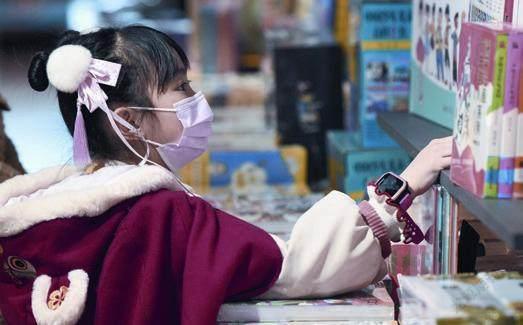BUSINESS BLENDING
2022-02-26ByLiXiaoyang
By Li Xiaoyang
During the seven-day Spring Festival holiday this year, which started on January 31, many Beijing residents chose to enjoy themselves in bookstores; but not just to uncover the latest in literature. PageOne Bookstore at Beijing Fun, a commercial and cultural complex in the capital city, became one of their most beloved haunts. Reading aside, visitors would have a cup of coffee and browse through the New Year picture exhibitions on display.
Even on regular days, the store is an attraction. Different from its conventional peers, the place often hosts various activities like lectures, exhibitions and craft workshops, catering to the evolving tastes of especially young people.
As domestic demand continues to upgrade, new business modes integrating sales, cultural activities and tourism both online and offline prevail, enhancing the overall shopping experience. Due to impacts of the COVID-19 epidemic, traditional restaurants and shopping malls have been elevated through delivery services as well as livestreaming. New services such as homestays, medical aesthetics and pet care have become increasingly common.
The government has stepped up support for the newfangled business forms. In July 2021, 12 ministerial departments released a document saying “convenient life circles” will be established with services available within a 15-minute walk for residents, encouraging entertainment and public facilities such as themed restaurants, bookstores with diverse amenities and gyms.
“Boosting the integration of businesses is significant to driving consumption. The authorities are supposed to provide more subsidies or tax breaks to encourage the renovation of brick-and-mortar commercial venues,” Wang Yun, a researcher with the Academy of Macroeconomic Research, told Xinhua News Agency.
Traditional sectors have seen a transformation in the tide of progressive smart consumption. In previous years, the emergence of e-commerce and live-streaming platforms posed challenges to physical retailers; coupled with epidemic containment measures, many restaurants took the lead in introducing more delivery options. Courier services later expanded to shopping malls, supermarkets and convenience store chains.
For those who can spare little time to do their shopping, many retailers have adopted customized services to help them find what they need and send the goods directly to their doorsteps. Since 2018, Beijing-based Wumart Stores Inc. has been working with mobile app Dmall to provide a supermarket self-checkout service. Data from Dmall showed that sales of Wumart stores across China rose 50 percent from July 2020 to March 2021, with online sales increasing 10-fold. The Dmall platform system based on big data has enabled the efficient management of Wumart goods and staff.
Similar modes of operation have also been adopted by businesses such as laundries and even second-hand car dealers. On January 17, the National Development and Reform Commission(NDRC) released a guideline on improving the digital revolution of retail companies to expand their online ordering and offline delivery structure, which will allow consumers to reach out to products and services with just one tap on their phones—and without leaving their homes .
The preference of many to venture outside in their free time has helped resume enthusiasm for offline consumption. For them, it’s not just about buying “stuff,”but about the joy and experience of going out for dinner or catching a movie. To persuade consumers to come back, offline businesses like bookstores and shopping malls have spent heavily on improving the environment and introduced various events and activities.
Opening in 2019, SKP-S Beijing, a high-end shopping outlet, is a popular place for young consumers, notably the Gen Zs. It not only offers high-quality products, but art and tech installations or Mars probe displays turn it into a zone for experiential shopping and photo ops. Decor aside, many shopping malls have integrated options ranging from restaurants to massage and skincare salons. Some have also launched themed bazaars and night markets to entice customers.
Offline consumption can meet the consumer gusto for shopping, entertainment, social activities and travel, a field in which shopping malls can develop distinctive edges compared with online stores, Zhao Ping, Vice President of the research institute at the Beijing-based China Council for the Promotion of International Trade, told ThePaper.cn, a Chinese news site.

New demand generates new business. In pursuit of novelty, today’s consumers have service requirements ranging from getting skincare at home to choosing the right pet training facility. Their lust for entertainment has notably branched out, including buying designer toys, posing for photos in themed homestays, indulging in live action role play or trying on traditional Chinese dress—also known as hanfu. Driven by the intensifying public passion for sports in recent years, many regions have launched indoor skiing and surfing venues.
The homestay sector saw a business surge during the Spring Festival holiday this year. To avoid COVID-19 infection risks, many people opted to take short trips. Data from online travel agency Tujia showed that homestay bookings on the platform rose over 20 percent year on year from January 31 to February 5.
The consumer exploration of new options derives from China’s overall improving life standards and styles. In 2021, per-capita disposable income of Chinese residents stood at 35,128 yuan ($5,539), up 8.1 percent year on year. Per-capita consumer spending, 24,100 yuan ($3,800), went up 12.6 percent year on year, topping the GDP growth of 8.1 percent, according to the National Bureau of Statistics.
As the government has continuously reinforced support for small and micro businesses and offline consumption is resuming, operators of commercial startups and self-employed sellers are feeling the turn for the better. “Despite rising operation costs and the boom of online platforms, brick-and-mortar stores still have promising prospects through the large domestic market. Innovation is always key to the sustainable growth of new business undertakings,” Zhao said.
While offering backing, the authorities have also strengthened regulations on malperforming businesses, such as unlicensed aesthetic medical services providers and live action role play clubs, to protect consumer rights and interests.
The new ventures are being boosted across the country to expand consumption and reinforce this year’s economic growth. According to the NDRC on February 5, it will improve the service quality of rural tourism, healthcare and elderly care, as well as that of special homestay facilities. It will also expand online and green consumption, and further integrate rural e-commerce platforms plus express delivery systems. BR
